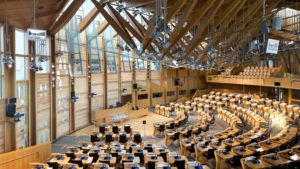Alex Neil | Twitter
Alex Neil was a SNP regional list MSP for Central Scotland from 1999 until 2011, and for Airdrie and Shotts from 2011 until 2021, when he retired. He served as Cabinet Secretary for Health and Wellbeing from 2012 to 2014 and Cabinet Secretary for Social Justice, Communities and Pensioners’ Rights from 2014 to 2016.
The three biggest challenges facing Scotland today are how we are going to provide the high-quality jobs we need for tomorrow’s world, tackle climate change and deal with the endemic levels of poverty and deprivation suffered by so many of our people.
As an independence supporter I believe that Scotland would be much more able to deal with these issues as a sovereign state. But even in the most optimistic scenario, independence is some years away. We must therefore meantime make maximum use of the powers the Scottish Parliament already has if we are to make serious progress in the years ahead.
In my view, under successive administrations, the Scottish Parliament has been too timid and small ‘c’ conservative during its first 20 years. It needs to adopt a more ambitious and radical programme of action than hitherto if it is to fully live up to the aspirations the Scottish people have for our nation.
I have a long list of measures I would like the Scottish Parliament to take across a range of policy areas. For the purposes of this short article, I am going to focus on four which in my book are of the highest priority.
Tax Reform
Our tax system needs to be radically overhauled to make it fairer and to incentivise people and businesses to invest in Scotland. We should abolish the council tax (which is totally unfair), business rates (which discourage business investment) and the Land and Buildings Transaction Tax (which is a very inefficient way to tax land and property.)
These three taxes should be replaced by two new taxes: a local services tax for both individuals and businesses, based on the principle of ability to pay; and a Danish style land value tax, which encourages investment and development and ensures that the community gets a fairer share of the increased value of land arising from public investments.
Housing
There is a dire shortage of housing throughout Scotland stretching across nearly every part of the country and every type of tenure. A much more ambitious housebuilding and repair and renovation programme is needed to meet the demand for housing as well as create many thousands of new jobs and apprenticeship opportunities in the construction industry.
The existing set-up of housing associations, local authorities and private sector developers does not have the required capacity to deliver the scale of housing investment needed in Scotland.
A new, dedicated Scottish National Housing Association is urgently needed to create enough capacity to massively expand the programme for new housebuilding, renovation and repair.
Such a body should operate at arms-length from the Scottish Government so it can take full advantage of the low-cost loan funding currently available for investment in new housing projects without being subject to the constraints of the Scottish Government’s borrowing limits.
The core remit of the SNHA should be to at least double the number of houses being built annually in Scotland, within the next few years. In so doing it should enhance the quality of new housing as well as introduce more choice for prospective tenants and buyers, in terms of location and funding; along similar lines to the national housing agency of Singapore.
Education
Although there is much to commend in the Scottish education system, we should be honest enough to accept there is also much that needs sorted. We can only offer the best possible chance in life to our young people if we invest heavily in their education and schooling. Our aim should be to get Scottish education back up to the top of the world rankings for performance, standards and attainment.
The policy makers in government must listen to what the people involved in Scottish education are telling them, including teachers, parents and pupils as well as those who are experts in Scottish education and who are willing to talk truth to power.
We should also stop making education policy into a party-political football and instead try to build a cross party consensus on the best way forward.
Top priorities for action include:
- Implementing a much more ambitious catch-up programme to help those children left behind during COVID
- Driving up our standards of education which have stagnated for far too long in comparison to our international competitors
- Making the necessary improvements to the curriculum in both primary and secondary schools
- Reforming vocational education to provide greater opportunities for people already in the workforce as well as young people joining the labour market.
A prerequisite to improving young people’s life chances is to close the attainment gap. To close the attainment gap, we need to do much more to reduce the unacceptably high levels of child poverty in Scotland. The most effective way to do that is to substantially increase the Scottish Child Payment as well as extend its eligibility; and to use the Scottish Parliament’s powers to increase Child Benefit for all recipients. This should be given top priority for funding, even if it involves cutting other Scottish programmes of lesser importance.
Jobs
Despite not having “macro-economic powers” there is till much more the Scottish Government can do to stimulate the creation of new jobs in Scotland. Here are just a few examples:
- Implement a Crash Re-Skilling Programme to tackle the huge skill shortages which are stifling many sectors of the Scottish economy, including IT, hospitality, health and social care, long-distance haulage, etc. The design, delivery and funding of such a programme should be done jointly by the Scottish Government and its economic development agencies, local councils, the relevant industry bodies and the companies struggling to recruit people to fill their vacancies. Where possible people who are unemployed or who are in poorly paid jobs should be encouraged to participate in this programme and thereby improve their skills, job prospects and career opportunities.
- Set up a publicly owned Scottish National Energy Authority to develop the energy sector in Scotland to provide cheaper, greener energy for Scottish consumers as well as develop the energy sector as a major source of new investment, jobs and exports for Scotland.
- Recognise that even in a world where we will all be driving electric vehicles, we will still need a decent road network. The Scottish Government should therefore confirm its commitment to complete the dualling of the A9 and A96 by 2025 and 2030 respectively. It should also commit to invest in other essential projects such as upgrading of the A77 south of Ayr, implementing a permanent solution to the problem of the Rest and Be Thankful, making rural roads safer, etc.
Every Scottish Government since devolution has made improvements to the lives of people living in Scotland but not on the scale and breadth they could and should have done. All of them have significantly increased the centralisation of decision-making in the governance of Scotland. This has been detrimental, especially to our poorer and remoter communities and should be reversed.
A big dose of audacity and dynamism urgently needs to be injected into Scotland’s body politic. Otherwise our dreams will never come true.






